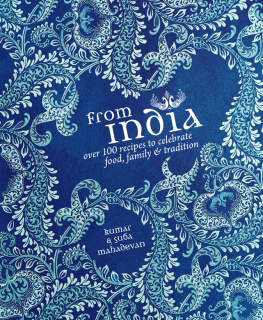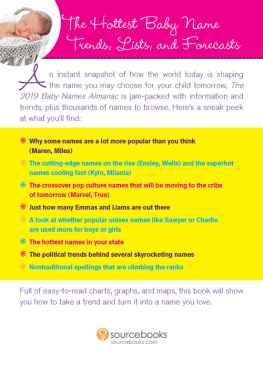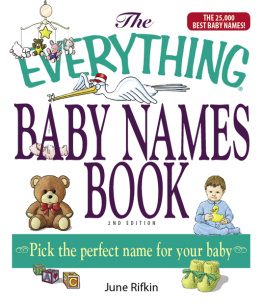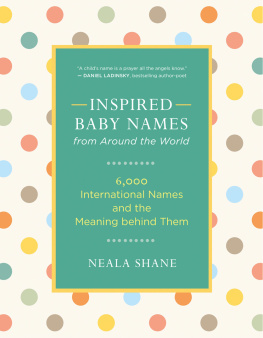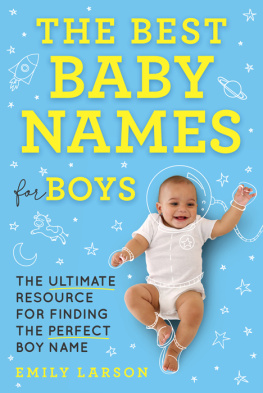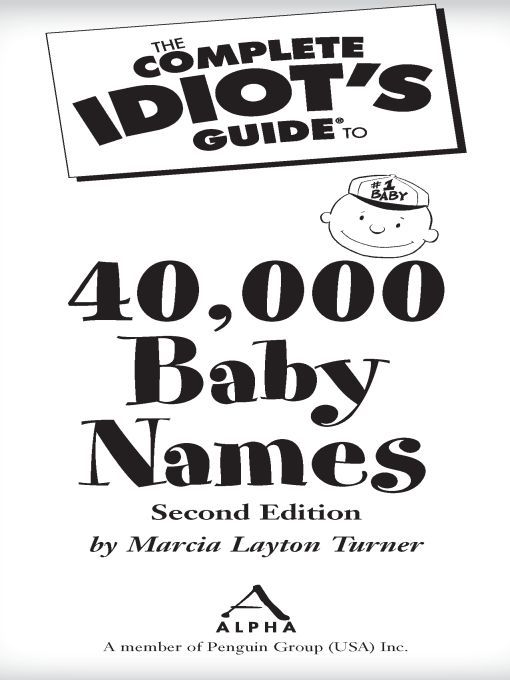Table of Contents
To Amanda and Grant.
Foreword
First names are fun. Its hard to pass up reading about such facets of our own name as its origin, meaning, usage in different countries, popularity at present and in the past, variations in spelling, spin-offs, diminutives, and the important peopleas well as the notorious ones (hopefully not too many of the latter)who share the name. Aside from the calories involved, reading about names is no different from eating popcornit is difficult to stop without dipping into the book for the same information about our parents, spouse, siblings, friends, and others.
An ironic feature of our name is that it says more about our parents and the period when we were born than it does about us. We had nothing to do with the choice; it was our parents (influenced by a variety of factors) who made a decision that the vast majority of us accept for the rest of our life. Parents often struggle over the choice they make. It is particularly easy for parents to torture themselves if they try to figure out what image their childs name will have andin turnhow others will respond to the name. Yes, names do differ in their imagery. (If you have any doubts about this, compare the names of performers who have changed their names, and consider how the shift in image fits in with the performers niche.) Seeking to make a good choice and avoid a disastrous one, many turn to books such as this one to get ideas and inspiration.
The fascination we have with names has an unfortunate consequence: it is easy to overlook special features of names that allow us to understand how our culture changes, to say nothing of the mechanisms that generate fashion and tastes. We live in a world in which our tastes in foods, cars, clothing, beverages, movies, music, and the like are affected by manufacturers, retailers, and industries that use high-powered advertising, subtle selling techniques, consumer research, and subliminal devices to affect our choices. Names, however, are refreshingly free of these effortsthere are no commercial efforts to influence the choices made by parents. An infants name matters not at all to diaper manufacturersI leave it to your imagination what does matter to them.
A second important feature is that names are free: you may or may not be able to afford a fancy car or an expensive home or take a cruise (unless we include rowboat rentals), but naming choices are not restricted by income. (Yet the classes differ in their tastes even though there is no economic restriction on their choices.) Fashions occur not only in such matters as clothing and names and music; fashions and tastes are also observed in scientific topics, school curriculums, political campaigns, corporate administration, views of the role of government, tax policies and priorities, and even our manners and choice of words. The study of names helps us discover not only the pure mechanisms of fashion and taste, but also how our society and culture have changed through the centuries.
Here are a few illustrations of these broader considerations. In many nations, names first became a matter of fashion and taste only in the latter part of the nineteenth century. Previously, choices were much less a matter of liking or disliking a name, but rather meeting obligations (naming a child after grandparents or other relatives, and following traditional practices). And whereas parents now worry if the name they choose will be too popular, at one point it was common for the five most popular names for each sex to be given to 50 percent or more of the infants born in a given year. Distinctiveness was once not a virtue. Although fashions in names may seem idiosyncratic and haphazard, often they follow orderly processes. Tastes are affected by parental education, other features of social class, race, ethnic origin, immigration status, region, and the like. On the other hand, just to whet your appetite, sociologists now know of a variety of special mechanisms that operate to change tastes in names without necessarily reflecting any social processes or having any special meaning. In effect, popular explanations of cultural changes are often way off the markseeking meaning when there is none.
Stanley Lieberson
Abbott Lawrence Lowell Professor of Sociology
Harvard University
Author, A Matter of Taste: How Names, Fashions, and Culture Change
(Yale University Press, 2000)
Introduction
Choosing a baby name is hard work! Its also a lot of fun, but unless you decided long ago what to name your children and your spouse or partner agreed, you may want some support. Perhaps a book with tens of thousands of exciting possibilities? Youre in luck, because youre holding such a book. Im here to help you find the name that fits your little one like a glove.
However, before you even start scanning the many names here, you might want to take a step back and discuss with your partner exactly what kind of name youre going for. Do you want a cool and edgy name, or a more traditional and preppy moniker? Perhaps artsy is more your style. Or were you thinking youd like a name befitting a future jock? If you can decide up front the kind of name you want, youll probably have an easier time narrowing your list to a manageable number of possibilities.
One approach is to choose a name from one of your familiesperhaps a parent, grandparent, or favorite aunt or uncle. Some families have standing traditions of naming children after certain relatives, which you may want to consider. Or maybe you could use a surnamea last nameas a first for your baby. It can be a great way to keep a family name alive.
As you start to create a list of possiblesnames that may workits always a good idea to check on the names original meanings. Although the importance of meanings isnt as prominent today as it was years ago, considering a names meaning may help you whittle down your list. Youd hate to saddle your child with a name that means loser or suggests he or she has a problem right from the get-go!
In addition to looking into the meanings of names, sounding them out is also smart. How does each name sound in conjunction with your last name or with the middle name you plan to use? Is it alliterative, with both names beginning with the same vowel or consonant sound? Or is it hard to pronounce? Or worse, does it create a phrase with its own meaning, such as Jean Poole or Ivy Leaf?
Although many of us want distinctive names, theres a fine line between distinctive and disaster. Come elementary school, your child may become the butt of some very painful jokes if you select a name that suggests an unflattering nickname.
And if you have your heart set on a particular name that just isnt working as a first name, theres always the middle name, which has become more and more common since the 1950s.
But the most important factor of all is whether you like it. Beyond how it sounds, what it means, how cool or uncool it is, how many other kids have the same name, whether it will irritate your relatives, or if it breaks with a long-standing family tradition, you and your significant other need to feel good about it. You need to love it. I hope this book helps you find a name that fits your baby to a T.
How This Book Is Organized
This book is presented in two parts:
In Part 1, Ideas and Inspiration: The Lists,






